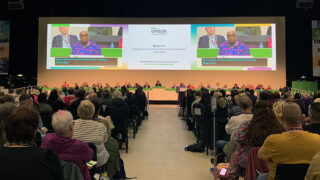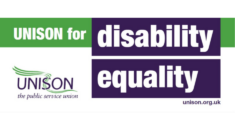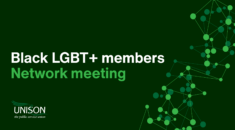Image: Rod Leon
Delegates convened in Brighton at the weekend for UNISON’s national Black members’ conference, passing motions that will underpin the achievements of 2023’s Year of Black Workers.
These included motions on the mental health of young Black members and children, the fight against microaggressions in the workplace and the appropriate treatment of Black patients and service users.
Much of the agenda’s importance comes in the light of continued government belligerence against migrant workers.
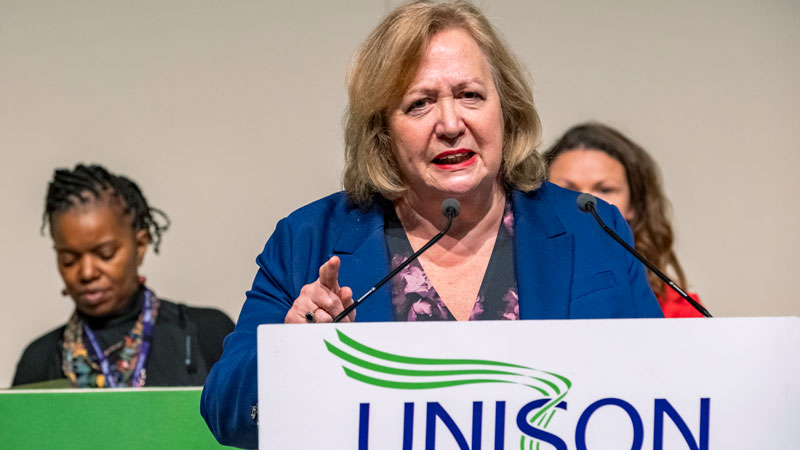
Image: Rod Leon
In addressing delegates, UNISON general secretary Christina McAnea (above) told them that the union had been given the go-ahead to join a legal challenge of former home secretary Suella Braverman’s decision to renege on three key recommendations made by the Windrush scandal inquiry.
“The Windrush generation haven’t had justice yet. Suella Braverman might have gone, but the Home Office is as unaccountable and cruel in its policies as ever,” she said.
“UNISON branches are busy organising and supporting our migrant worker members, who are still facing a hostile environment, especially in social care. These are members who get treated like second-class citizens in this country, even as they help prop up health and social care services.”
Ms McAnea added: “With each passing day – whether it’s harsh immigration rules, lack of justice for the victims of Windrush, or the Rwanda plan – this government is writing a new chapter in the history of racism in the UK.
“And that’s why building on UNISON’s legacy of Year of Black Workers is so important.”

Moving the motion on securing that legacy, on behalf of the national Black members’ committee, Lola Oyewusi (left) told delegates: “We must keep the fire burning.”
The motion noted that 2023 saw “a renewed and focussed approach” to challenging racism in the workplace and improving the experiences of Black workers both in the workplace and wider society.
And Ms Oyewusi said: “We cannot forget to acknowledge our national officers, equality secretaries, regional officers and branches for the hard work done to make 2023 a successful Year of Black Workers.”
She raised a number of aims, including the continued need to ensure that the structures of representation within UNISON are “truly inclusive” and to enlist more allies in workplaces, communities and political platforms to help end the issues of the ethnicity pay and pension gaps.
Conference further called on the national committee to:
- Work with regional Black members’ self-organised groups to evaluate the success of the 2023 Year of Black Workers
- Work with regional Black members to establish a programme of continued activity to build on the achievement of the Year of Black Workers
- Engage with the regional groups and the national Labour Link committee to secure the mandatory reporting on ethnicity pay gaps across employment sectors
- Publicise ongoing work, campaigns, and achievements of regional Black member’s groups, via social media and the UNISON website, disseminated across the union.
Delegates were presented with a Year of Black Workers memorabilia booklet, charting many of the events that took place during the year.
Caring for Black patients and service users
A composite motion, submitted by Bath health branch and the national Black women’s committee, noted that the COVID-19 pandemic had underlined the lack of appropriate personal care for Black patients and service users across health and social care.
It was noticeable that health and social care staff avoided black hair or skin, as they didn’t understand how to care for it and didn’t feel they could ask.
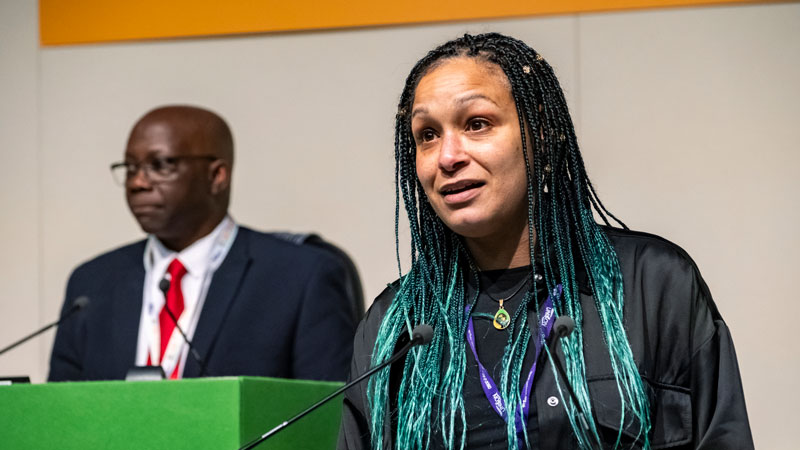
Image: Rod Leon
The Bath health branch has successfully worked with the employer to train staff to be more aware of the needs of Black patients and how to care for them in a way appropriate to their own personal care regimes.
Conference heard that the branch initially provided appropriate products to the wards and departments, but these are now being provided by the trust. Equality of care has become “the norm”.
Alvina Ware, of Bath health (above), who instigated that work, told her fellow delegates: “I was a child of care and lived in a children’s home. Whilst there I wasn’t caring for my hair because of the lack of hair and cream products. I petitioned social services for funds to help me maintain my dignity. They agreed and gave me £30 a month for my hair and skin.
“My project started when I was a child. So this needs to change now.”
Conference agreed actions that will ensure consideration for all patients’ and service users’ physical care, taking into account their diverse cultural needs and personal care regimes.
Fight against microaggressions
In 2022, the TUC highlighted that within work ‘microaggressions’ come in the form of insecure work, such as zero-hours contracts, little or no career progression and lack of training opportunities.
Its research showed that nearly one in six Black male workers experience insecure work; Black women are twice as likely to be on zero-hour contracts as white men; and the total annual cost of pay penalties experienced by Black, Indian, Pakistani and Bangladeshi men and women was estimated at £3.2 billion per year.
Sandra Okwara of the national Black members’ committee, said: ‘Whether it is intentional or not, this type of behaviour can be hostile, derogatory, with negative attitudes towards people from different cultural groups.
“UNISON has been running training courses around this issue and we hope to develop this further, to help equip our activists to represent members who may be experiencing his type of behaviour in the workplace.”
Conference called on the committee to:
- Work with Learning and Organising Services (LAOS) to produce training materials to help Black members identify and challenge microaggressions in the workplace
- Work with LAOS to produce microaggressions training for activists
- Work with the bargaining and negotiating team to produce guidance for activists, supporting them in negotiating robust policies which focus on zero tolerance of microaggression.
The Year of LGBT+ Workers
Having celebrated the success of the Year of Black Workers, delegates voiced their support for UNISON’s decision to make 2024 the Year of LGBT+ Workers.
The conference heard that, since the Stonewall riots in 1969, Black people have always been at the centre of the LGBT+ liberation movement. And it agreed that 2024 was “UNISON’s opportunity to promote Black activists and the contributions that they have made to challenging homophobia, biphobia and transphobia in society.”



